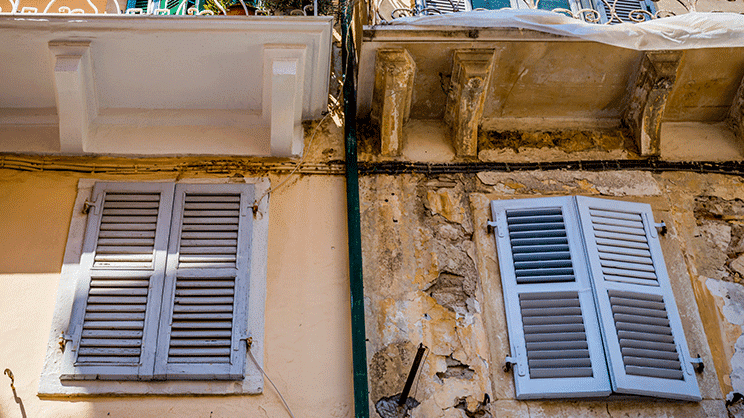Today, France has almost 1.5 million degraded housing units. The Law of April 9, 2024, published in the Official Gazette of April 10, 2024, therefore aims to speed up and simplify the restoration of this habitat. “This is a text rich in concrete and effective measures that will enable communities, government services, landlords and specialized operators to better manage dramatic situations on the ground and encourage early intervention in this habitat,” summarizes the Ministry of Ecological Transition and Territorial Cohesion.
This new law therefore has three goals: preventing habitat degradation, speeding up the reconstruction of degraded housing and fighting slum lords. Enriched during parliamentary scrutiny, the text went from 17 initial articles to 59 articles.
Intervene before the final deterioration
The law expands the scope of works that can be the subject of an asset restoration operation (ORI), in order to encourage its use in an earlier stage of damage. The text creates a new procedure for the expropriation of “worthless buildings for rehabilitation”. This will apply to residential property owners who have been affected by at least two dangerous or unsanitary orders in the last ten years, where the requirements of these orders have not been fully implemented. This procedure is designed to enable interventions uphill, on objects whose condition is critical but can still be saved. Associations of co-owners will be able to raise a joint global loan to finance the repair, improvement or maintenance of buildings.
The rehabilitation of degraded housing is now integrated into the support and advisory missions of the National Agency for Territorial Cohesion (ANCT). The goal: to facilitate access to the necessary engineering resources for small and medium-sized local authorities. The association Foncière Logement, a subsidiary of the Action Logement group, will be able to intervene in the operations of the planned improvement of housing (OPAH) and in the ORIs. All renovation works on residential buildings in difficulties will be able to use the guarantee of the Energy Renovation Guarantee Fund (FGRE).
Several provisions reinforce the rental permit. The introduction of a rental permit will thus be possible even in the absence of a local housing program (PLH). As part of the permit review, the mayor or the president of the inter-municipal authority responsible for housing issues can visit the accommodation and impose fines in the case of renting without registration or prior approval. The mayor can also allow automated operation or even demolish buildings that do not comply with town planning rules and pose a safety or health risk.
If there is any doubt about the solidity of individual buildings, mayors can request a structural diagnosis of buildings located in areas of degraded or old residential construction, at the owner's expense. At the initiative of parliamentarians, the new law establishes the obligation of the owner to ensure the permanent occupancy of the tenant, if within 3 years they do not perform tasks prescribed by dangerous or unhygienic conditions. Another provision of the text introduced by the Government will allow the prefects to experimentally encourage the owners of endangered or unhygienic residential buildings to enter into lease contracts for rehabilitation with the aim of their renovation. Furthermore, in order to ensure the treatment of degraded co-ownerships, the Law prescribes a ban on confiscation of co-ownership bank accounts in the collection process. In addition, the ad hoc mandate procedure has been facilitated.
A concession regime is established for dealing with degraded co-ownership. The urban right of first refusal has been expanded to facilitate and ensure its implementation by municipalities that wish to use it as a means of combating habitat degradation. Finally, the tax reduction granted to the owners of old apartments (the “Denormandie system”) is extended until 2027 and extended to renovation works of degraded housing in residential buildings in great difficulty.
Speed up the reconstruction of degraded residential buildings
The new law establishes a regime of judicial division of co-ownership in recovery as part of the operation of requalification of degraded co-ownerships (ORCOD). The legislator's goal: to solve the problem of huge co-ownerships.
At the same time, the text strengthens the procedure for early possession in the context of operations to requalify degraded housing. The process of expropriation of non-conditional buildings without rehabilitation is certain, especially with regard to buildings containing business premises. Finally, the statement on the deficiency of co-ownership was made easier. The text also reforms tools that can be used as part of an operation of national interest (OIN) to save time on projects.
Fight the slum lords
The new law tightened criminal sanctions against slum owners. The additional penalty of the ban on acquiring real estate (except for the main residence) is thereby increased from 10 to 15 years. In the same spirit, the fact that the lessor refuses to enter into a lease agreement or to issue a certificate or certificate of lease will now be punished with a prison sentence of up to 1 year and a fine of 20,000 euros. In addition, an article introduced by the Senate allows local authorities to provide free of charge property seized from slum lords for use as housing.
The application of the common tenancy standard of decency to the dwelling, rather than to each tenant, has allowed certain slum lords to implement informal subdivisions of dwellings to cram households into them. To give mayors the means to counter such practices, municipalities will now be able to set stricter decency requirements for shared tenancies with multiple tenancies. This measure must be tested for 5 years.

